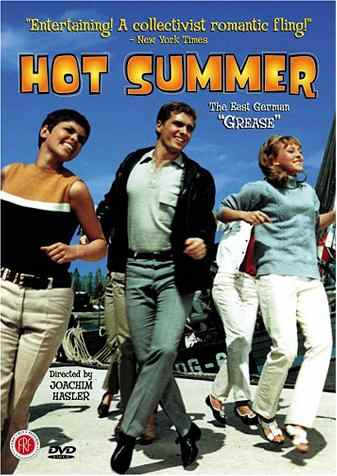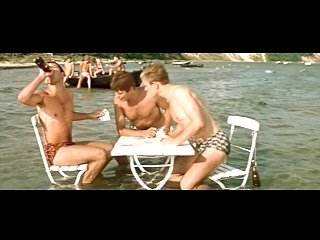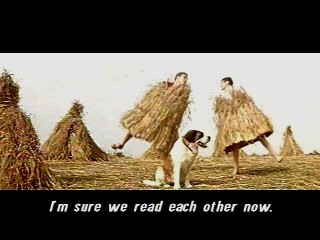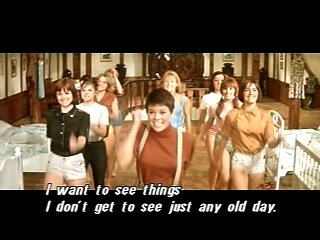|
Hot Summer
(1967)
Director: Joachim Hasler
Cast: Frank Schobel, Chris Doerk, Hanns-Michael Schmidt
When I was young, I would sometimes use my wild
imagination to picture the various hardships I would be going through
had I been born behind the Iron Curtain. Back in my mind, I did have an
idea that communist life couldn't be as bad as I saw it in various
Hollywood movies and TV shows. But even before I reached my teenage
years, I realized that true communism must still suck to live in. After
all, I had a taste of it growing up here in
 Canada,
where the government has flirted with socialism for the past several
decades; though it has brought some nice things like health care, I
have seen it also create true horror, such as The Evil Known As
Canadian Films. (In other words, heavy on the art, with virtually no
entertainment value to be found.) Canada,
where the government has flirted with socialism for the past several
decades; though it has brought some nice things like health care, I
have seen it also create true horror, such as The Evil Known As
Canadian Films. (In other words, heavy on the art, with virtually no
entertainment value to be found.)
It goes without saying that I wasn't exactly exposed to
a lot of the viewpoint of communism from the communists themselves.
Only just recently did I learn the horrors that the youth behind the
Iron Curtain had to face, and that came when I watched the 1967 East
German youth-oriented movie Hot Summer. Just from the
title, I could tell this would be a heavy-handed piece of propaganda.
After all, hot things are frequently red in color,
aren't they? So I then sat down and started to watch the abuse that
East German teens had to go through during the late '60s, which
included leaving their parents to go on a long holiday without adult
supervision, hitchhiking, smoking cigarettes, singing and dancing to
pop songs, sometimes engaging in sex - huh?!? What's going on
here?
Seriously, I had a pretty good idea of what communist
life was like in a lot of Iron Curtain countries before seeing this
movie. The most recent lesson I had was when I reviewed East Side Story a couple of weeks
ago, which was a documentary on Iron Curtain musicals. Funny how
coincidences can happen in the world of unknown movies; when I
originally wrote the review, I mentioned in one part how I'd like to
see some of those musicals. Just before I was about to put up the
review, the generous folks at First
Run Features offered to send me a DVD of Hot Summer,
one of the movies showcased in the documentary. Excited to have the
opportunity (as well as to save a couple of bucks from not having to
rent a movie), I said yes, wondering before its arrival just how
different it would be from the American teen-oriented musicals of the
same era, like the Frankie and Annette Beach Party
series. Well, as it turns out, it actually isn't that much different
from what the Americans were making at the time. In fact, the most
surprising thing about the movie is that it is virtually free of what
might be considered to be pro-communist propaganda. And the little
that's there is so subtle, so small, that there is the possibility that
this material may not have even been intended to be propaganda.
Like many of those American teen musicals, Hot
Summer barely has any plot to speak of. In fact, I am not sure
if it's of minimum size to be even considered a plot - the premise of
the movie is only expanded just enough so that there's justification to
bring teenagers together away from home and their parents so they can
fool around together (in more than one sense of the word), as well as
to make excuses  for them
to break out singing and dancing every few minutes. The movie starts
off with a group of female teenagers (including East German teen pop
sensation Chris Doerk) preparing to leave the big city in order to
spend a lengthy vacation on the Baltic Sea coast. To their horror, they
quickly stumble across a group of male teenagers (among them
Frank Schobel, another East German teen pop sensation) who are also
preparing to make the trip to the coast - and they are equally
horrified to know that a group of girls will be there to spoil their
vacation. (I can't help but think that the people who wrote this movie
forgot what it was like to be a teenager.) for them
to break out singing and dancing every few minutes. The movie starts
off with a group of female teenagers (including East German teen pop
sensation Chris Doerk) preparing to leave the big city in order to
spend a lengthy vacation on the Baltic Sea coast. To their horror, they
quickly stumble across a group of male teenagers (among them
Frank Schobel, another East German teen pop sensation) who are also
preparing to make the trip to the coast - and they are equally
horrified to know that a group of girls will be there to spoil their
vacation. (I can't help but think that the people who wrote this movie
forgot what it was like to be a teenager.)
As you might expect, an instant rivalry appears between
the two groups, and each side makes a real effort to humiliate and put
into their place the other group, not just during the trip there but in
the first few days at the coast. Though deep down they all feel some
attraction to various members in the other group, pride for one's
buddies usually wins the day. After all, didn't Marx and other
communist philosophers have the theory that the group is more important
than the individual? Maybe these teens aren't actually thinking like
these philosophers, but they do try to rally their comrades against
drifting from the group agenda. Not only with spoken words, but often
with songs, like this one:
A man who is still half a kid
Can at times act pretty stupid!
They think they're such big guys
But really they're babies in disguise!
They're so proud to have to shave
But they don't know how to behave!
They roll their eyes, that's not half!
They act crazy and make me laugh!
A real man can do without
Such juvenile tactics, no doubt!
He doesn't whine and plead
Like a little bitty kid!
If at first he does not succeed
And I don't say he's just what I need
I don't need such silly pranks!
To them I say: Hey, no thanks!
Well... it's not quite the title track for How
To Stuff A Wild Bikini, but it'll do. Seriously, though, the
soundtrack for Hot Summer has a number of remarkably
goofy songs like this one. And I personally though that the movie's
willingness to break out singing every few minutes or so soon proved to
be very tiring. But individually, the songs are fun to listen to with
their campiness, while at the same time you are realizing that at one
time these pieces of fluff were "with it" with the youth of that day.
(The soundtrack album was a big hit, by the way.) Even if you find the
songs somewhat dumb you'll probably agree that they are at least sung
with energy and conviction. It's also interesting to listen to the
styles of the songs, since they are similar to the styles of American
teen pop in that day. There is the (expected) slow summer-fading-away
ballad, but there are also "duel" numbers, when the boys and the girls
sing separate lines of the songs.
I doubt very much it is a coincidence that a couple of these "duel"
numbers at times sound remarkably similar to Here Come The Jets
from West Side
Story. Especially since the stalking motions and circling the
actors engage in during these numbers sometimes echoes the style of
dancing found in West
Side Story! The most interesting thing about Hot Summer's
dance numbers is
the amount of effort made to make the actors look like
they are dancing when they actually aren't dancing at all. True, there
is occasionally a span of a few seconds when it could be considered
that the participants are actually dancing. But as I mentioned with
East Side Story, the Powers That Be behind the Iron Curtain
frowned upon frivolous activities like dancing. So as a result, the
teenagers here will cartwheel, spin in their seats, jump in the air,
shuffle their feet, and strike dramatic poses - but seldom actually
dance. It's quite interesting to watch, sometimes in an unintentionally
funny sense when they do something like bounce up and down rapidly (as
well as the fact that care was done to have this energetic activity
shot from above the waist, a la Elvis.) like
they are dancing when they actually aren't dancing at all. True, there
is occasionally a span of a few seconds when it could be considered
that the participants are actually dancing. But as I mentioned with
East Side Story, the Powers That Be behind the Iron Curtain
frowned upon frivolous activities like dancing. So as a result, the
teenagers here will cartwheel, spin in their seats, jump in the air,
shuffle their feet, and strike dramatic poses - but seldom actually
dance. It's quite interesting to watch, sometimes in an unintentionally
funny sense when they do something like bounce up and down rapidly (as
well as the fact that care was done to have this energetic activity
shot from above the waist, a la Elvis.)
Goofy or not, the dancing and singing these teenagers engage in are,
for the most part, the most interesting things about them. Seen
together, the behavior of the boys and girls is at times a little
exasperating; even though they are teenagers, they act remarkably
childish at times. It's no wonder the movie spends more time with the
more mature girls, because for the most part all the male characters -
even Schobel - come across as if they were ten years old. Each of them
has little personality, and seldom do any of them separate from their
pack. The girls also stick together for the most part, and like the
boys many of them aren't developed in the slightest, even with the
characters of the two identical sisters. On the other hand, while
Doerk's character may not be developed much more than her co-stars, she
does bring to the movie energy and spunk, so that even when she isn't
singing she manages to stick out in the crowd. The character of "Brit"
(who takes the communist philosophy of free love to heart) also manages
to stand out from the other girls, though her character and her "hobby"
are not really touched upon until late in the movie.
Even then, the movie doesn't really expand on her character that much.
Still, there are some interesting moments surrounding this character,
though none of them are love scenes - the participants keep their
clothes on, and their togetherness comes across as if they had just
spent a long time looking at the stars. In the morning, when Brit
returns to where the girls have been staying (in the island's meeting
hall which belongs to The Collective), her friends are upset with her -
not just because of her behavior, but the fact that her staying out all
night put them all at risk from the adult authorities. "If you were
alone, you could what you please, " one of the girls snaps at Brit.
That's not the only possible pro-communist suggestion to be found in
the movie. There is an emphasis on sticking together (such as the girls
and boys sticking for the most part within their group), though one boy
is quick at one point to separate themselves from any old rabble,
exclaiming, "Are we a collective or just an ordinary gang?"
If these (and a few similar moments) were intended as propaganda, then
they
don't come across very strongly. Maybe they were just placed in so that
The
Powers That Be  Would be
satisfied. It could also have been an attempt to mask some material
that has hints of being anti-communist. Near the end of the movie,
after the boys and girls get in trouble after joyriding on a fishing
boat, one boy exclaims that the authorities will "bash our skulls in."
When they are subsequently locked up in a warehouse, we see them look
up longingly at an open window - and later on they escape to freedom
through this window. It's not just the boys who provide some of these
possible hints, but also the girls. In the opening credits, a chorus
sings a song which contains the following lyrics: Would be
satisfied. It could also have been an attempt to mask some material
that has hints of being anti-communist. Near the end of the movie,
after the boys and girls get in trouble after joyriding on a fishing
boat, one boy exclaims that the authorities will "bash our skulls in."
When they are subsequently locked up in a warehouse, we see them look
up longingly at an open window - and later on they escape to freedom
through this window. It's not just the boys who provide some of these
possible hints, but also the girls. In the opening credits, a chorus
sings a song which contains the following lyrics:
Just for once I want to go wild
And act like a child!
I confess I can't be totally sure whether those
particular lyrics - or any of those other elements I noted in the
previous paragraphs - were indeed intended to be propaganda of one kind
or another. But it's fun to try and spot anything that might be
propaganda, and then to subsequently try and determine if it is
or not. This, as well as the novelty of seeing an Iron Curtain teen
movie - and one that's a musical to boot - make Hot Summer
a curio that is definitely worth a look. Even if the movie's official
motive to entertain sometimes comes across flat to the average 21st
century viewer, the passage of time has given the movie an extra
dimension that makes up for it.
Check for availability on Amazon (VHS)
Check for availability on Amazon (DVD)
See also: East Side Story,
Shock Treatment, Voyage Of The Rock Aliens
|

 Canada,
where the government has flirted with socialism for the past several
decades; though it has brought some nice things like health care, I
have seen it also create true horror, such as The Evil Known As
Canadian Films. (In other words, heavy on the art, with virtually no
entertainment value to be found.)
Canada,
where the government has flirted with socialism for the past several
decades; though it has brought some nice things like health care, I
have seen it also create true horror, such as The Evil Known As
Canadian Films. (In other words, heavy on the art, with virtually no
entertainment value to be found.)
 for them
to break out singing and dancing every few minutes. The movie starts
off with a group of female teenagers (including East German teen pop
sensation Chris Doerk) preparing to leave the big city in order to
spend a lengthy vacation on the Baltic Sea coast. To their horror, they
quickly stumble across a group of male teenagers (among them
Frank Schobel, another East German teen pop sensation) who are also
preparing to make the trip to the coast - and they are equally
horrified to know that a group of girls will be there to spoil their
vacation. (I can't help but think that the people who wrote this movie
forgot what it was like to be a teenager.)
for them
to break out singing and dancing every few minutes. The movie starts
off with a group of female teenagers (including East German teen pop
sensation Chris Doerk) preparing to leave the big city in order to
spend a lengthy vacation on the Baltic Sea coast. To their horror, they
quickly stumble across a group of male teenagers (among them
Frank Schobel, another East German teen pop sensation) who are also
preparing to make the trip to the coast - and they are equally
horrified to know that a group of girls will be there to spoil their
vacation. (I can't help but think that the people who wrote this movie
forgot what it was like to be a teenager.) like
they are dancing when they actually aren't dancing at all. True, there
is occasionally a span of a few seconds when it could be considered
that the participants are actually dancing. But as I mentioned with
East Side Story, the Powers That Be behind the Iron Curtain
frowned upon frivolous activities like dancing. So as a result, the
teenagers here will cartwheel, spin in their seats, jump in the air,
shuffle their feet, and strike dramatic poses - but seldom actually
dance. It's quite interesting to watch, sometimes in an unintentionally
funny sense when they do something like bounce up and down rapidly (as
well as the fact that care was done to have this energetic activity
shot from above the waist, a la Elvis.)
like
they are dancing when they actually aren't dancing at all. True, there
is occasionally a span of a few seconds when it could be considered
that the participants are actually dancing. But as I mentioned with
East Side Story, the Powers That Be behind the Iron Curtain
frowned upon frivolous activities like dancing. So as a result, the
teenagers here will cartwheel, spin in their seats, jump in the air,
shuffle their feet, and strike dramatic poses - but seldom actually
dance. It's quite interesting to watch, sometimes in an unintentionally
funny sense when they do something like bounce up and down rapidly (as
well as the fact that care was done to have this energetic activity
shot from above the waist, a la Elvis.) Would be
satisfied. It could also have been an attempt to mask some material
that has hints of being anti-communist. Near the end of the movie,
after the boys and girls get in trouble after joyriding on a fishing
boat, one boy exclaims that the authorities will "bash our skulls in."
When they are subsequently locked up in a warehouse, we see them look
up longingly at an open window - and later on they escape to freedom
through this window. It's not just the boys who provide some of these
possible hints, but also the girls. In the opening credits, a chorus
sings a song which contains the following lyrics:
Would be
satisfied. It could also have been an attempt to mask some material
that has hints of being anti-communist. Near the end of the movie,
after the boys and girls get in trouble after joyriding on a fishing
boat, one boy exclaims that the authorities will "bash our skulls in."
When they are subsequently locked up in a warehouse, we see them look
up longingly at an open window - and later on they escape to freedom
through this window. It's not just the boys who provide some of these
possible hints, but also the girls. In the opening credits, a chorus
sings a song which contains the following lyrics: